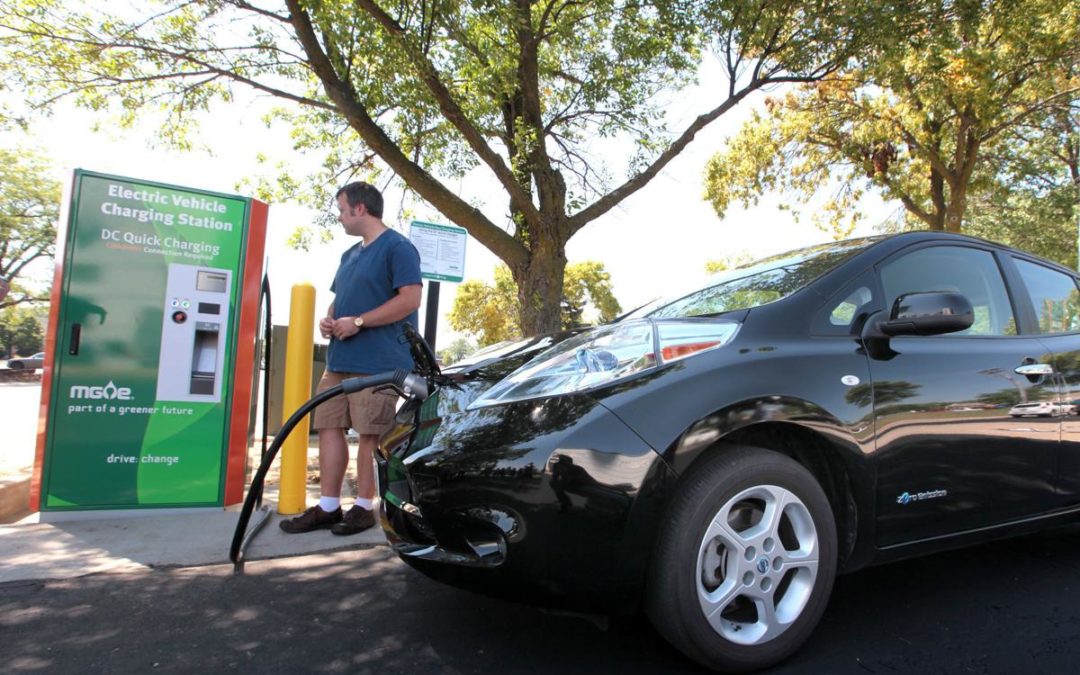
by Orrie Walsvik | Mar 14, 2024 | Electric Vehicles, Electrification, NEVI, RENEW Wisconsin
On March 12, 2024, the Wisconsin State Senate passed Bills 791 and 792, allowing electric vehicle (EV) charging stations to charge by unit of electricity instead of time spent charging. The bill helps provide clean energy access to all Wisconsinites and is a testament to Wisconsin’s commitment to embracing new, proven clean energy technologies. The new law addresses several critical areas to standardize EV usage and infrastructure deployment for private developers. Let’s dive into some of the key parts.
NEVI Funding Unleashed
The cornerstone of the bill is the activation of National Electric Vehicle Infrastructure (NEVI) funding for “Level 3” fast chargers. This funding, totaling a substantial $78 million of federal dollars for Wisconsin, will be channeled toward the building, operation, and maintenance of fast-charging stations across the state. These fast chargers, capable of significantly reducing charging times for longer trips, are vital for reducing range anxiety.
Charging All Over the State, Not Just in Cities
NEVI funding also avoids putting the cart before the horse by providing charging stations across the state, along highway routes for the next five years, paying for the cost of the station, the operations, and the maintenance. Check out the map below to see the routes.
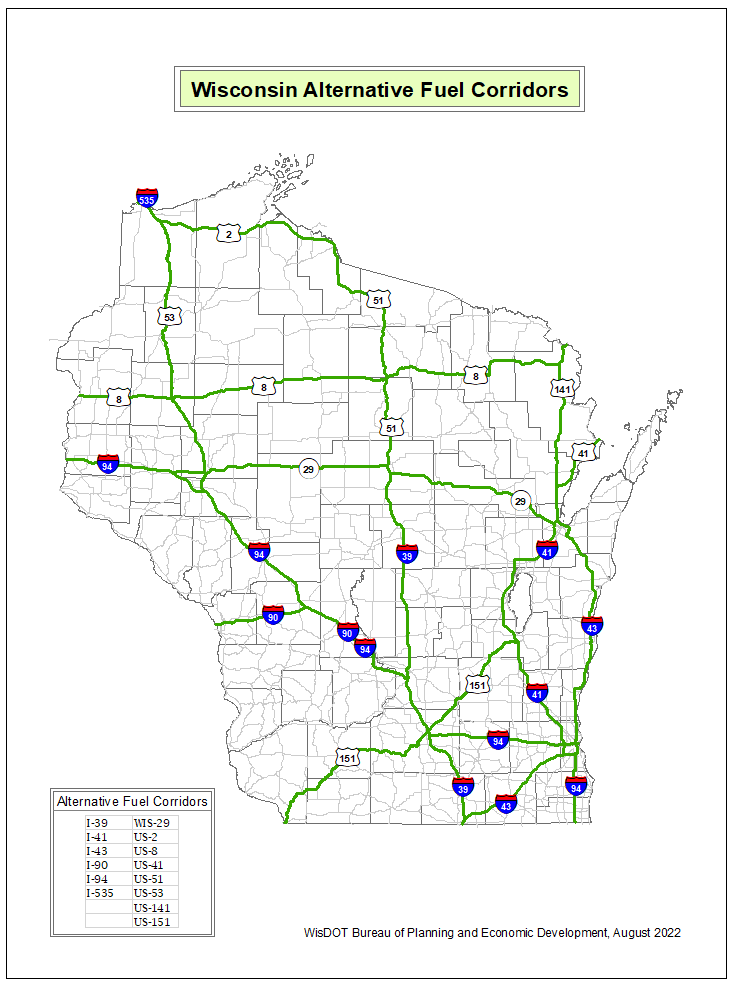
Jobs, Training, Reliability & Safety
But the bill doesn’t stop there. It also emphasizes the importance of training, ensuring that those responsible for these chargers are equipped with the skills necessary to maintain their reliability and safety. Chargers must be operable at least 97% of the time to receive the funding. This commitment to training not only boosts job opportunities but also ensures that the infrastructure remains robust and dependable.
Protects Level 1 and Level 2 Chargers
The Legislation clarifies that residential Level 1 and Level 2 chargers are clear of tax and regulation. It also provides regulatory certainty for groups looking to install public level 1 and level 2 chargers to avoid classification as a public utility, clearing up a large regulatory hurdle for EV Charging implementation. This protection ensures that these residential and light commercial chargers have a realistic path forward in Wisconsin. This move is a win for EV owners and businesses alike, fostering a more flexible and user-friendly charging landscape.
Tax and Road Fund
A tax, similar to the gas tax, of 3 cents per kilowatt-hour (kWh) of electricity used for charging will be implemented for public EV chargers. This measure brings EVs in line with gas and diesel cars. Charging by the kWh also ensures customers pay for the amount of fuel received instead of the amount of time spent charging, a policy that favored individuals with more expensive cars. Now, all users will pay a fair price for their power and end the inequity of time-based charging. Unfortunately, EVs are still required to pay $175 for registration, $75 more than fossil fuel cars.
This bill pairs regulatory certainty for charging station owners with equitable locations and rates for EV drivers. The bill also clarifies how and when local governments can own EV charging stations, and does not effectively change the situations of previously existing chargers.
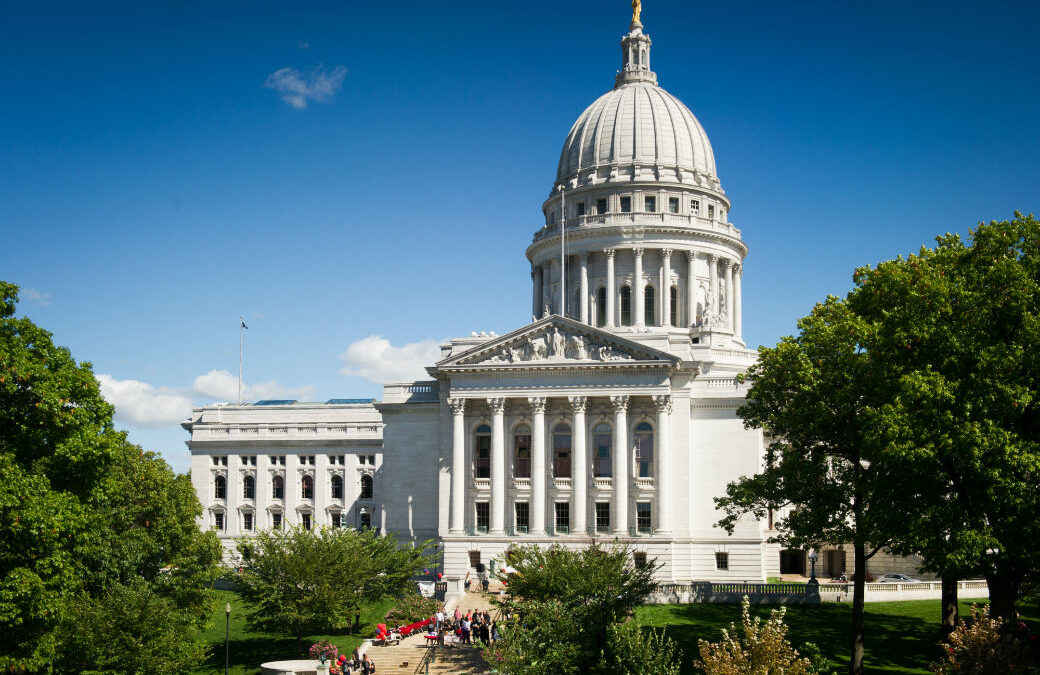
by Beata Wierzba | Mar 14, 2024 | Advocacy, Electric Vehicles, Legislative Watchlist, Local Government, NEVI, Solar
As the legislature wraps up for this session, RENEW is celebrating several victories and reflecting on some of the other renewable energy measures being considered by the state legislature.
Big Win for Electric Vehicle Infrastructure
Senate Bill 791, the Electric Vehicle Charging Bill, passed the legislature with several amendments. The legislation exempts private entities that develop charging stations from being regulated as a public utility but allows them to measure the cost of electricity used for charging EVs by the kilowatt hour (kWh). Establishing this new kWh standard to calculate how much electricity is used, rather than how long it takes to charge the vehicle, provides an essential uniform requirement for the industry. It is also required by the National Electric Vehicle Infrastructure (NEVI) Program for Wisconsin to qualify for $78 million dollars in federal funding, an 80% cost share, for level 3 chargers to build corridors for charging. RENEW will be developing a detailed overview of the passed legislation for those interested in more information. The bill received bipartisan support and limited opposition. In other actions related to electric vehicles, the Legislature also passed SB 792, which establishes the infrastructure program and enables the state to utilize the federal NEVI funding. Additionally, with the passage of SB 617, the DOT will issue registration plates or stickers for existing license plates that indicate the vehicle is electric.
Progress on Community Solar
The community solar bill, Assembly Bill 258, did not pass either the Senate or Assembly but did get a hearing in the Assembly Committee on Energy & Utilities. This is a significant development considering the heavy opposition from Wisconsin Utilities. The public hearing was a great opportunity for the benefits of community solar to be shared with state legislators. During the hearing, supporters of community solar were able to answer questions, correct misinformation, and show their unity and strength. Establishing a community solar program for renewable energy generation is essential for those without the option to install panels on their own roofs, or the financing necessary to cover costs. Under the community solar arrangement, the participants subscribe to the developed project and receive a credit on their electric bill for solar electricity generated on panels installed in a community setting. The developer arranges permitting, financing, and installation, as well as maintenance. If passed, the legislation would require approval of the location by local governments and be limited to 5 megawatts or about 26 acres. Each project would also require at least four subscribers. With fierce opposition in some areas to larger utility-scale operations, the community solar model is a better fit.
Other Legislative Wins
There were numerous bills that aimed to limit renewable energy development, including restrictive sitting and increased regulation. They did not pass, and in most cases, did not receive a hearing. These bills ultimately died in committee.
Assembly Joint Resolution 6
Assembly Joint Resolution 6 (AJR6) would give the Wisconsin Legislature control over how federal funds are spent, rather than the Governor, on behalf of the state. Recent examples of federal funds distributed to the states include the Inflation Reduction Act (IRA) and the Bipartisan Infrastructure Law (BIL), both have benefited Wisconsin’s clean economy. The Wisconsin constitution directs the Governor, as head of state, to oversee disbursement. In order to change the constitution, identical legislation has to pass the legislature twice in a row and then be considered by state voters. Because it is not regular legislation but a joint resolution of the legislature, the Governor does not have veto power. After the passage, the resolution language will become the referendum during an upcoming election, with the resolution language being the exact question asked. If voters approve the referendum, the state will need to modify the constitution. The consequences of this change can impact many efforts, such as conservation measures, disaster relief funds, higher education, and more. The earliest statewide election when this referendum can be placed on the ballot is the August primary. Efforts are on the way to provide information and educate the voters on the impact the change could have on issues of importance to them.
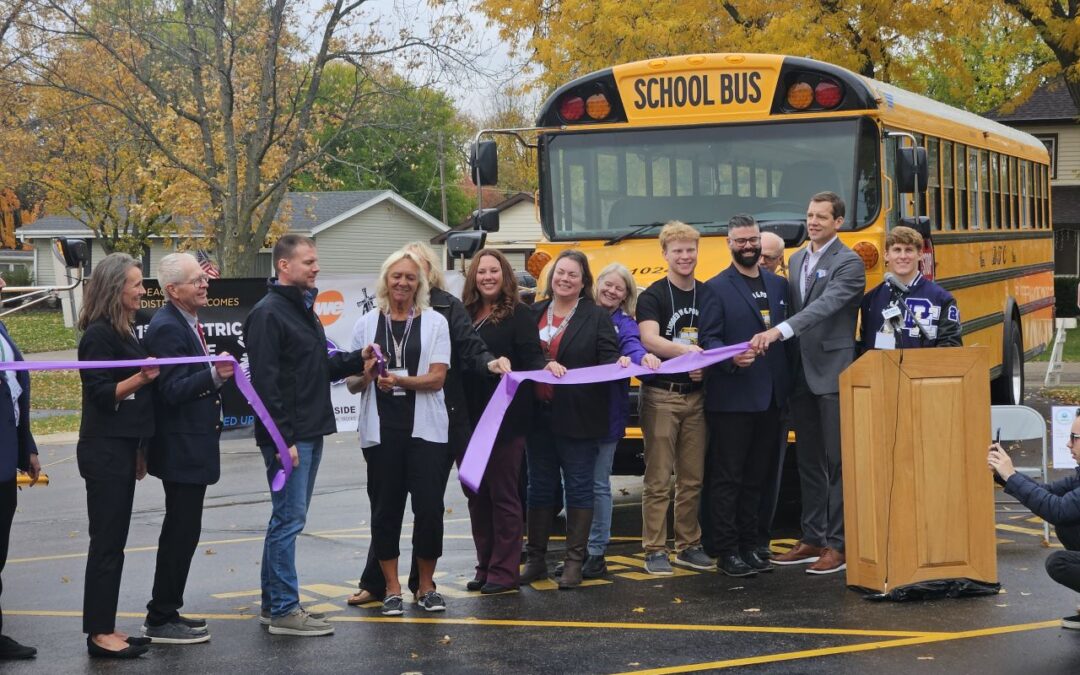
by Alex Beld | Feb 23, 2024 | Electric School Bus, Electric Vehicles, Electrification, RENEW Wisconsin
“About six years ago, this school district was on the verge of dissolving for a variety of reasons,” said Dr. Ryan Krohn, district administrator. “When we doubled down our efforts as a board to stay open, we said we’d invest in innovation and sustainable efforts.”
In the fall of 2022, the district applied for the Clean Bus Program Grant through the EPA, funded by the Bipartisan Infrastructure Law. As they charted their path forward, the leaders of the Palmyra-Eagle Area School District had to shift their thinking about the future, which ultimately led to electric buses.
When the school district learned about the EPA grant, they brought the idea of transitioning to electric buses to the school board. Together, district leaders and the board looked at how this change aligned with their goals of safe, healthy, and effective schools.
“We knew it was going to require new thinking, new experiences, and ultimately, we looked at this as a starting spot to transform our system,” Krohn said.
When considering the transition to electric school buses, the district looked at efficiencies that would be gained, not only in terms of the costs from fuel savings but also in terms of health, safety, and the environment. Addressing these aspects required the district to strengthen and build new partnerships with key stakeholders. This included energy utilities, local police, the transportation company they work with, and many other partners. Thanks to the support they received in return, they became the first school district in Wisconsin to start using electric buses to transport their students.
“There’s no way our school district, being led by someone like myself, was going to be able to be able to pull this off (alone),” Krohn said .”My background is not in this.”
The district was ultimately awarded $2 million dollars, enough for six electric school buses. Since receiving the buses, Ryan has been participating in webinars and other events to share the story of Palymra-Eagle’s journey. That journey and the connections they made along the way have led to the district leaders altering how they look at their 10-year capital plan. It has also led to greater engagement with the community.
“Our recent efforts, just because of this, ended up in our community donating money for a new greenhouse,” Krohn said. “We have a strong agricultural program in our school district.”
Both the electric school buses and this new greenhouse serve as educational tools for the students of the Palymra-Eagle School district. As Dr. Krohn said, it also empowers their students and engages them in thinking about the shifts that need to happen for our energy future.
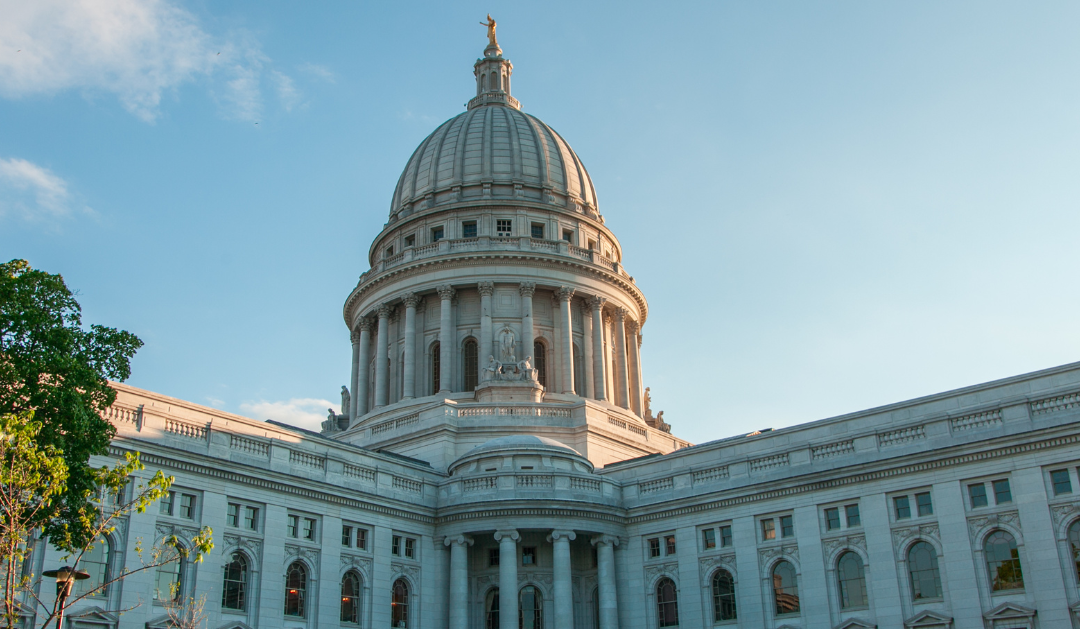
by Beata Wierzba | Jan 23, 2024 | Advocacy, Electric Vehicles, Local Government, Public Service Commission
Wisconsin’s state legislature has acted swiftly this January to move legislation impacting electric vehicles (EV) through the legislative process. The Senate version of the proposed EV bill, SB 791, has already passed through the Senate Utilities & Technology Committee with a recommendation for passage. Similarly, the Assembly version of the bill, AB 846, cleared the State Assembly Committee on Energy & Utilities.
The legislation also passed through the Joint Committee on Finance and Joint Survey Committee on Tax Exemptions, gathering favorable votes. Most recently, the full Senate passed their version of the bill in a 30-2 vote. The next step is a vote by the full Assembly after which the bill will go to the Governor’s desk.
As with all legislative bills, amendments and tweaks along the way are common. There have been three amendments added so far, and we are analyzing the impact of these on the original bill.
The focus of the bill is to allow non-utilities to seek payment from EV drivers based on the amount of electricity they use to charge their vehicles rather than the time it takes for the vehicle to charge. This qualifies Wisconsin public and private entities to receive federal dollars to help build charging infrastructure while also establishing operational and maintenance requirements for the chargers.
National Electric Vehicle Infrastructure (NEVI) funding would be available for up to 5 years, which is especially beneficial for areas where the market is not yet ready to support EV infrastructure but could in a few years. This allows the areas that currently have less EV traffic to build EV charging infrastructure to support a growing user base.
RENEW initially raised concerns about the impact the bills would have on existing EV charging facilities and the need for the state to have similar opportunities for infrastructure that local governments would. Those concerns have been addressed in part within the proposed amendments.
SB 791 and AB 846 bring Wisconsin in line with 48 other states while providing uniform access, pricing, accountability, and standards for EV Charging. We expect to see the bill become law.
by Lynn Markham | Jan 8, 2024 | Electric Vehicles, Electrification
The number of electric vehicles (EVs) is increasing rapidly in the U.S. and worldwide. Wisconsin saw an increase from 319 EV registrations in 2013 to 9,039 EV registrations in 2021 and 13,893 EV registrations in 2022. The increase is driven by several factors, including advances in technology, cost savings for EV owners, decisions made by state policymakers, and commitments by automakers. By the year 2030, there may be as many as 19 million EVs on the road in the U.S.
Adopting EV charging standards can save businesses and homeowners money because it’s much less expensive to install EV charging infrastructure during new construction than it is to retrofit buildings after they are built. Municipalities need to plan for the increasing number of EVs and the cost savings of installing EV charging infrastructure during new construction so that residents can access charging stations at businesses and their homes.
What Policies Help Ensure EV Readiness?
In Wisconsin, the two main tools that take advantage of building and parking infrastructure to move us toward EV readiness are zoning and building codes. The following offers a short explanation of each policy tool, its current status in Wisconsin, and examples.
Zoning
More than fifty state and local governments in the U.S. have enacted zoning ordinance amendments or building code amendments to ensure EV readiness. Each local government decides individually which provisions to include in their general zoning ordinances. Zoning ordinance amendments for EV chargers typically have three components:
- EV charging definitions
- Designated zoning districts for EV charging stations
- Requirements for electrical wiring and other infrastructure for EV chargers in new construction (optional)
When deciding where EV charges will be permitted, it is important to keep in mind that, unlike gas stations, EV charging stations don’t create the risk of fuel spills, underground fuel leaks, or fumes. Example approaches include:
- Allowing Charging stations in all zoning districts as was done in Des Moines, IA
- Allowing level 1 and 2 charging stations in all districts and allowing level 3 fast chargers in industrial and highway commercial districts as was done in Chelan, WA
You can choose from the menu of zoning provisions for EV chargers in Ready for Electric Vehicles? Modifying Local Land Use Policies starting on page 8 to tailor ordinance provisions to fit your community.
State and Local Building Codes
Wisconsin has a state-level Uniform Dwelling Code (UDC) and a Commercial Code that are adopted by the Wisconsin Department of Safety and Public Services. This does not include standards for wiring or other EV charging infrastructure. Municipalities cannot alter these building codes, so they are precluded from including EV charging station requirements. This is true for the state’s Uniform Dwelling Code for one and two-family dwellings and the state’s commercial building code.
Many states and municipalities use the International Building Code as their base code and may add additional standards to tailor the code to their community.
- International Building Code. The International Building Code (IBC) is updated every three years, and the 2021 code went into effect in October 2021. The IBC is a set of voluntary guidelines used by many states. The 2021 IBC calls for one EV-ready parking space, which means installing panels, outlets, and conduits capable of charging at least one full-size EV in a single-family garage overnight. Multi-family buildings will need two EV-ready parking spaces, along with more that can be easily retrofitted, a standard known as EV-capable. The decision to install an EV charger is left to the property owner.
- State and local building codes:
- In the central part of the U.S., Minnesota, Kansas, and North Dakota have adopted the 2018 IBC in their state building codes.
- In contrast, Wisconsin has its own residential code, known as the Uniform Dwelling Code (UDC) for one and two-family dwellings based on the 2009 IBC, and a commercial building code based on the 2015 IBC.
- On August 10, 2023, the Wisconsin Senate Housing, Rural Issues, and Forestry Committee rejected an update to bring the state’s commercial building codes up to date with the 2021 IBC.
- A Wisconsin law passed in 2013 established a uniform statewide commercial building code and prohibits municipalities from adopting or enforcing their own standards, making Wisconsin one of only three states to restrict local control, according to the American Council for an Energy-Efficient Economy. Similarly, the Wisconsin UDC does not allow municipalities to adopt more stringent standards. The current Wisconsin building codes do not include standards for EV charging standards, and communities cannot add these standards to their building code. Wisconsin is working on updating its building codes, which are outdated. Big EV infrastructure questions in these updates are as follows:
- Will Wisconsin adopt a UDC and commercial code that includes current EV infrastructure standards?
- Will Wisconsin change from one-size-fits-all UDC and commercial code to allow communities to choose to tailor their building codes, which could include requiring EV-ready parking spaces?
Takeaways
Driving electric has many benefits. The number of EVs and EV charging stations are increasing rapidly. While current EV drivers in the U.S. charge 80% of the time at home, one-third of Wisconsin households rent their home and do not get to decide if EV charging is available where they park. The installation of EV charging infrastructure is four to six times less expensive when included during new construction versus a building retrofit. Because of this, EV charging standards in building codes and zoning ordinances can save businesses and homeowners money.
Each local government decides individually which provisions to include in their general zoning ordinances. Zoning ordinances are useful tools for local governments to indicate where public EV charging is allowed or prohibited. Local governments may also choose to require electrical wiring and other infrastructure for EV chargers in new construction.
EV charging standards are not included in the current statewide Wisconsin UDC or commercial building code. Current Wisconsin laws do not allow communities to voluntarily add EV charging standards to their building codes. When tailoring EV charging standards to fit communities, we can learn from the many states and communities that have already amended their zoning ordinances and building codes to ensure EV readiness.
– Lynn Markham, Center for Land Use Education

by Beata Wierzba | Dec 21, 2023 | Advocacy, Community Solar, Electric Vehicles, Legislative Watchlist, Local Government, Policy, Solar
Though the year is coming to a close, RENEW Wisconsin’s efforts to support electric vehicle (EV) charging and community solar will continue into 2024. RENEW staff recently had the opportunity to testify before the Senate Committee on Utilities and Technology to share our support for SB 791.
We are also working with the Community Solar Coalition to get a hearing on the community solar bill. The Coalition is reaching out to leadership in the state legislature along with the chairman of the Senate Committee on Utilities and Technology to advance the bill to the next step.
EV Charging – SB 791
RENEW Wisconsin staff testified before the Senate Committee on Utilities and Technology on December 19, 2023. In our testimony we shared our support for SB 791, explaining that it will align the state of Wisconsin’s laws with the National Electric Vehicle Infrastructure (NEVI) Standards and Requirements set by the Federal Highway Administration and qualify for NEVI funds.
NEVI requires that the payment for charging your vehicle be based on kilowatt hours of electricity used rather than time. In Wisconsin, making electricity available by the kilowatt hour (kWh) is restricted for non-utilities. As it stands, the EV stations operating in the state have consumers pay by the amount of time it takes to charge rather than the amount of electricity used.
Allowing private entities to sell electricity by the kWh to charge an electric vehicle without being regulated as a utility will grant Wisconsin $78 million in NEVI dollars. These dollars are needed to fund the build-out of electric vehicle charging infrastructure and establish operational and maintenance standards.
This bill will bring Wisconsin in line with 48 other states and provide uniform access, pricing, accountability, and standards for EV Charging. More importantly, establishing the kWh standard for Wisconsin is time-sensitive as the deadline to qualify for the NEVI funds is the end of February 2024.
During our testimony, we recommend two improvements:
First, we ask for the grandfathering of all existing EV charging facilities up to the date when this new law becomes effective. We believe that early adopters of EV charging should not be forced to make costly changes to their existing systems and investments. Additionally, allowing the current economic and ownership arrangements to continue would not compete with the new systems but rather continue serving the market.
Second, we asked that the bill be modified to allow state government entities to lease land for charging or that they be able to partner with a private entity to host facilities. This change would allow charging stations to be placed in remote places that private businesses may not find suitable.






